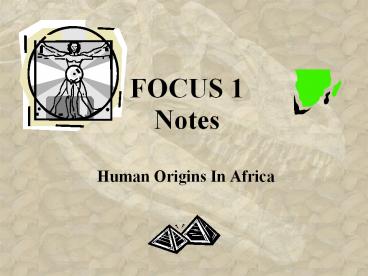FOCUS 1 Notes - PowerPoint PPT Presentation
1 / 31
Title: FOCUS 1 Notes
1
FOCUS 1Notes
- Human Origins In Africa
2
- No written records of prehistoric peoples
- Prehistory dates back to 5,000 years ago
3
- Evidence shows that the first hominids originated
in Africa more than 3 million years ago. - These hominids, australopithecines, had opposable
thumbs and could walk upright.
4
Scientists Search for Human Origins
5
Scientists Discover Clues
- archaeologists excavate early settlements
- artifacts are manmade objects
6
- anthropologists study culture
- culture a peoples way of life
7
(No Transcript)
8
- paleontologists study fossils
- fossils are rocks which have evidence of
early life
9
Mary Leakey Finds Footprints
- an archaeologist who discovered humanlike
footprints in East Africa in - 1978
- hominids are creatures that walk
- australopithecines is a hominid
10
footprints made by australopithecines
11
australopithecines is a hominid
12
Johanson Discovers Lucy
- Johanson discovered the first adult female
- skeleton in 1974
- the skeleton was named Lucy
13
- Lucy lived about 3.5 million years ago
- Lucy is the oldest living hominid found
- Lucy was an australopithecines species
14
(No Transcript)
15
Hominids in Motion
- easier to travel distances
- easier to spot dangerous animals
- easier to carry food and children
- opposable thumb made picking up small
- objects and making tools easier
16
Paleolithic Age
- During the Paleolithic Age, people learn to make
tools, use fire, and use language. - The hominid Homo habilis appears about 2.5
million years ago in Africa and may be the first
to make stone tools. - A more intelligent hominid, Homo erectus, becomes
the first to use fire and to migrate from Africa.
17
Progress During the Old Stone Age
- Some achievements during Stone Age were invention
of tools, controlling fire and development of
language - Paleolithic Age (2.5 million to 8000 B.C.) was
the earlier part of the Stone Age in the Ice Age - The earliest stone chopping tools can be dated to
the Paleolithic Age - Neolithic Age (8000 to 3000 B.C.) was known as
the New Stone Age. - In the Neolithic Age people learned to polish
stone tools, make pottery, grow crops and raise
animals
18
Homo Habilis The First Toolmaker?
- 1960 Mary Leakey discovers a hominid
fossil in northern Tanzania. - the fossil was named Homo Habilis which means
man of skill - the Leakeys also found tools made of lava rock
19
B. Homo Erectus Is More Intelligent
- appeared while Homo habilis still existed
- means upright man
- thought to be more intelligent and
- adaptable than Homo habilis
20
- able to develop technology, learn to
- hunt, made tools for digging, scrapping and
cutting
21
- first hominid to migrate from Africa
- They migrated to India, China,
- Southeast Asia and Europe
- first to use fire, begin using spoken
- language, organize into work teams
22
New Improved Humans
- The Neanderthals, the first modern humans, are
resourceful hunters who survive in Ice Age
winters, have religious beliefs, and perform
ritual burials. - Cro-Magnons, the first fully modern humans,
gradually replace the Neanderthals. - New discoveries are adding to knowledge of human
origins.
23
The Dawn of Modern Human
- Homo erectus developed into Homo sapiens
- Homo sapien means wise men.
- Homo sapiens had a larger brain than the hominids
before them
24
Neanderthals Way of Life
- lived between 200,000 and 30,000 years ago
- tried to explain and control their world
25
- developed religious beliefs and performed
- rituals
- belief in world beyond grave
26
- lived in caves or shelters made of animal skin
- disappearance is a mystery
27
Cro-Magnons Emerge
- appeared about 40,000 years ago
- identical to modern humans
28
Arrgh! Theres always one bone left over!!!
- first to plan hunts which contributed to
population increase - used advanced spoken language skills to
- plan more difficult projects
29
Recent Findings Add New Knowledge
- 1944 fossils and tools found in Ethiopia
indicate first toolmakers were in earlier time
period than originally thought
30
- Neanderthal bone flute found in New York
- in 1996 indicates
- added talents
- attempts to adapt to
- environment
- through
- technology was
- beginning of a
- revolution
31
Key Ideas
- The first hominids, emerge in East Africa
about 3.6 million years ago. They gradually
develop large brains and learn to make tools and
use fire, which allows them to spread over the
earth.































